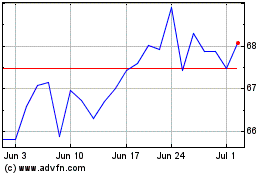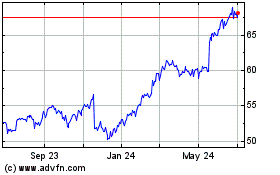By Sarah Nassauer and Robin Sidel
Wal-Mart Stores Inc. has taken the unusual step of making its
shoppers feel the pain of a dispute with Visa Inc.
The retail behemoth Monday stopped accepting Visa credit cards
at three of its Canadian stores, marking a rare consumer-facing
battle in an escalating war between the biggest global retailer and
credit-card companies, largely over the fees Wal-Mart pays
them.
Despite months of talks, Wal-Mart said it was unable to agree on
terms with Visa. The retail chain argues that the fees it pays when
shoppers use the cards are too high. U.S. stores, which account for
62% of Wal-Mart's global sales, are unaffected by the Canada
dispute and work under a different agreement.
For the showdown, Wal-Mart picked Thunder Bay, Ontario, a town
of 120,000 at the northwest corner of Lake Superior relatively
isolated from other major Canadian and northern U.S. cities.
"It's an escalation. They want to see what the consumer does and
they want to see what Visa does," said Dave Marcotte, a senior vice
president at Kantar Retail, a research and consulting firm.
Because of Thunder Bay's size and location, it's a relatively
low-risk gambit. "The location kind of keeps things contained,"
said Mr. Marcotte.
Wal-Mart plans to roll out the change in phases across Canada,
where it has 405 stores, said a company spokesman. The company
hasn't set a timeline.
Visa says it is working to ensure Canadians can use their cards
everywhere they wish to shop -- including at Wal-Mart stores.
Visa also says there's no evidence that reductions in
credit-card-related fees in other countries have resulted in
savings for consumers.
Some customers caught in the middle voiced their displeasure
Monday. "I think Wal-Mart just lost a couple of thousands of
dollars a month from one family," said Rebecca Zajac, who uses her
Visa card from Royal Bank of Canada each week when she shops at one
of the Thunder Bay stores.
Ms. Zajac, who previously saw the signs at Wal-Mart warning that
they would stop accepting Visa on Monday, says she stocked up on
things she likes buying at Wal-Mart in advance and will go to a
different grocery store that accepts Visa this week. Wal-Mart had
posted signs at the front of its Thunder Bay stores in June saying
it planned to shut off Visa.
Ms. Zajac, a chef who briefly worked as a Wal-Mart greeter about
15 years ago, says she and her husband are debating whether to go
back if Wal-Mart starts accepting Visa again.
Wal-Mart spokesman Alex Roberton said: "We regret any customer
dissatisfaction" and that the store is "taking a stand for our
customers because Visa's high fees can result in increased prices."
Mr. Roberton said fewer than 10 customers out of thousands in
affected stores Monday didn't have the right form of payment.
Visa and MasterCard Inc. agreed in late 2014 to cap Canadian
fees at roughly 1.5%, but Wal-Mart and other large merchants
typically are able to negotiate their own deals.
A retailer blocking a credit card "is extremely rare," said Joel
Bines, managing director at AlixPartners, a consultancy. Retailers
are offering shoppers more ways to pay, from card types to mobile
payment, said Mr. Bines. "Probably the last thing a retailer should
be doing in today's fight for consumer share is making it harder
for customers to shop."
Earlier this year, Wal-Mart and Kroger Co. filed separate
lawsuits against Visa related to new chip-enabled debit cards meant
to enhance the cards' cybersecurity features. The retailers say
that when shoppers use the new chip cards, they should be able to
only type in a personal identification number, or PIN.
Visa's rules require that customers also have the choice of
signing. Retailers say signing is more expensive and less secure
than a PIN. U.S. merchants paid roughly $40 billion in interchange
fees last year -- roughly 2% of every transaction, according to
payments consulting firm R.K. Hammer Inc.
Meanwhile, a federal appeals court in June threw out a $7.25
billion antitrust settlement between Visa and MasterCard and
millions of retailers after determining that some of the merchants
covered by the pact weren't adequately represented, ending a
class-action lawsuit that had stretched over a decade.
In Canada, around 59% of people say Wal-Mart is right to cut off
Visa from stores, according to a recent poll from the Angus Reid
Institute, a Canadian polling agency. However, almost half of
Wal-Mart shoppers surveyed who use Visa said they are less likely
to shop there if the card is banned.
The companies worked to win over public opinion Monday. On
Twitter, Visa's Canadian account took a jab at Wal-Mart, noting
that Visa is still accepted at many stores in Thunder Bay "most of
them local small businesses."
Visa also started offering a $25 gift card to cardholders who
spend at least $75 at grocery stores. On social media, Wal-Mart
repeated its mantra that Visa's fees indirectly raise prices in
stores.
It's more common for a merchant to cut off acceptance of a
single card brand in the case of a contract's expiration, such as
when Costco Wholesale Corp. recently stopped accepting American
Express cards because it struck a new deal with Citigroup Inc. and
Visa.
Write to Sarah Nassauer at sarah.nassauer@wsj.com and Robin
Sidel at robin.sidel@wsj.com
(END) Dow Jones Newswires
July 18, 2016 18:41 ET (22:41 GMT)
Copyright (c) 2016 Dow Jones & Company, Inc.
Walmart (NYSE:WMT)
Historical Stock Chart
From Mar 2024 to Apr 2024

Walmart (NYSE:WMT)
Historical Stock Chart
From Apr 2023 to Apr 2024
